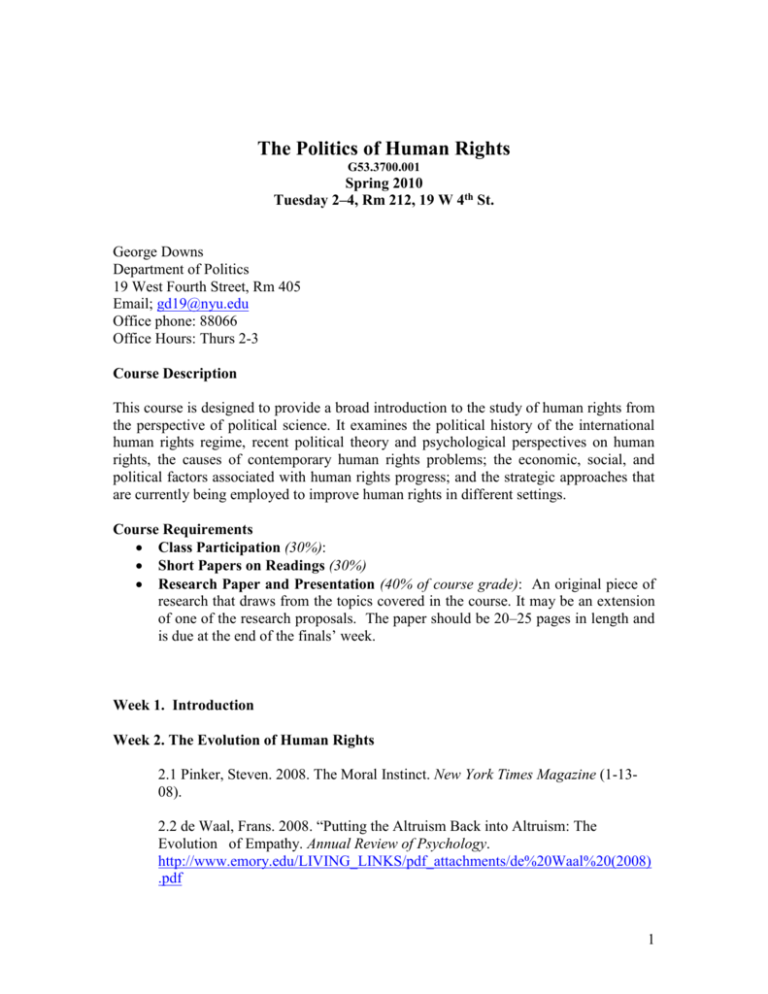Week 9: Reputational Sanctions - Department of Politics, New York
advertisement

The Politics of Human Rights G53.3700.001 Spring 2010 Tuesday 2–4, Rm 212, 19 W 4th St. George Downs Department of Politics 19 West Fourth Street, Rm 405 Email; gd19@nyu.edu Office phone: 88066 Office Hours: Thurs 2-3 Course Description This course is designed to provide a broad introduction to the study of human rights from the perspective of political science. It examines the political history of the international human rights regime, recent political theory and psychological perspectives on human rights, the causes of contemporary human rights problems; the economic, social, and political factors associated with human rights progress; and the strategic approaches that are currently being employed to improve human rights in different settings. Course Requirements Class Participation (30%): Short Papers on Readings (30%) Research Paper and Presentation (40% of course grade): An original piece of research that draws from the topics covered in the course. It may be an extension of one of the research proposals. The paper should be 20–25 pages in length and is due at the end of the finals’ week. Week 1. Introduction Week 2. The Evolution of Human Rights 2.1 Pinker, Steven. 2008. The Moral Instinct. New York Times Magazine (1-1308). 2.2 de Waal, Frans. 2008. “Putting the Altruism Back into Altruism: The Evolution of Empathy. Annual Review of Psychology. http://www.emory.edu/LIVING_LINKS/pdf_attachments/de%20Waal%20(2008) .pdf 1 2.3 Slovic, Paul. 2007. Psychic Numbing and Genocide. Judgment and Decision Making, 2(2): 79-95. 2.4 Waldron, Jeremy. 2009. “Right and Wrong: Psychologists vs. Philosophers.” New York Review of Books. 56(15). Recommended Readings: Fraser, Arvonne S. 1999. “Becoming Human: The Origins and Development of Women’s Human Rights.” Human Rights Quarterly 21(4): 853-906. Glendon, Mary Ann. 2001. A World Made New: Eleanor Roosevelt and the Universal Declaration of Human Rights. New York: Random House. Week 3: Political Theory and Human Rights 3.1 Stand Up For Your Rights! 2007. Economist 5/22/07. 3.2 Pogge, Thomas 2005. “World Poverty and Human Rights” Ethics in International Affairs 19(1). 3.3 Cohen, Joshua 2004. “Minimalism About Human Rights: The Most We Can Hope For?” Journal of Political Philosophy, 12(2):190-213. 3.4 Cohen, Joshua and Charles Sabel 2006. Extra Rempublican Nulla Justitia? Philosophy and Public Affairs 34(2): 147-175. 3.5 Cohen, Jean. 2008. “Rethinking Human Rights, Democracy, and Sovereignty in the Age of Globalization.” Political Theory 36(4): 578-606. Week 4. The Epidemiology of HR Problems I 4.1 Web sites: Amnesty International, HR Watch, International Crisis Group, Freedom House (see Freedom in World Rankings, Historical Trends in Media Freedom). 4.2 Landman, T. 2004. “Measuring Human Rights: Principle, Practice, and Policy.” Human Rights Quarterly 26: 906. 4.3 Landman, Todd 2005. “The Political Science of Human Rights.” British Journal of Political Science. 35:549-572. 4.4 Davenport, Christian (2007). “State Repression and Political Order.” Annual Review of Political Science 10:1-23. 2 4.5 Bueno de Mesquita, et al. The Logic of Political Survival, Chapter 8 4.6 Acemoglu and Robinson, Economic Origins of Democracy and Dictatorship, pp. 1-30, Chapter 5 Week 5 The Epidemiology of HR Problems II: Conflict and Incapacity 4.1 Englehart, N. A. 2009. “State Capacity, State Failure, and Human Rights.” Journal of Peace Research 46(2):163. 4.2 Hoeffler, Anke and Marta Reynal-Querol 2003. “Measuring the Costs of Conflict” World Bank http://www.patrir.ro/london/september/Costs%20of%20Conflict%20Mapping/200 3_Hoeffler_Reynal.pdf 4.3 Walker, Scott and Steven C. Poe. 2002. “Does Cultural Diversity Affect Countries’ Respect for Human Rights?” Human Rights Quarterly 24(2): 237-263. 4.4 Hayarimana, James et al. “Why Does Ethnic Diversity Undermine Public Goods Provision?” APSR 101(4): 709-725. Week 6: HR Progress via Democratization and Development 6.1 Bueno de Mesquita, Bruce, Feryal Cherif, George Downs and Alastair Smith. 2005. “Thinking Inside the Box: A Closer Look at Democracy and Human Rights.” International Studies Quarterly 49(3): 439-458. 6.2 Jensen, Robert and Emily Oster. “The Power of TV: Cable Television and Women’s Status in India. Quarterly Journal of Economics. 6.3 Ross, Michael. 2008 “Oil, Islam, and Women.” American Political Science Review 102(1): 107-122. 6.4 Davenport, Christian. 2004. “The Promise of Democratic Pacification: An Empirical Assessment.” International Studies Quarterly 48(3): 539-560. Week 7: The Birth of the Transnational/International Human Rights Movement 7.1 Hochschild, Adam. (2006) Bury the Chains. New York: Houghton Mifflin 3 Week 8: Human Rights Agreements 8.1 Hathaway, Oona. 2002. “Do Human Rights Treaties Matter?” The Yale Law Journal 111:1935-2042. 8.2 Neumayer, Eric. 2005. “Do Human Rights Treaties Improve Respect for Human Rights?” JCRS 49(6):925-953. 8.3 Goodman, Ryan and Derek Jinks. 2003. “Measuring the Effect of Human Rights Treaties.” European Journal of International Law 14(1): 171-183. 8.4 Cole, WM. 2005. “Explaining the Commitment to International Human Rights Covenants 1966-1999.” American Sociological Review 8.5 Smith, Kei. 2008. “Comparing state and international protections of indigenous people’s human rights.” American Behavioral Scientist 53(12) 18171835. Week 9: Reputational Sanctions 9.1 Goodman, Ryan and Derek Jinks. 2004. “How to Influence States: Socialization and International Law.” Duke Law Journal 54: 621-. 9.2 “Reputation, Compliance and International Law.” Journal of Legal Studies, Vol 31 (1): 595-115. 2002. Mike Jones co-author. 9.3 Hafner-Burton, Emily. 2008. “Sticks and Stones: Naming and Shaming and The Human Right Enforcement Problem,” International Organization 62:4. 9.4 Keenan, PJ. “Financial Globalization and Human Rights.” Columbia Journal of Transactional Law. Week 10: Trade Agreements, Economic Integration and Human Rights 10.1 Moravcsik, Andrew. 2000. “The Origins of Human Rights Regimes: Democratic Delegation in Postwar Europe.” International Organization 54(2): 217-252. 10.2 Hafner-Burton, Emile. Trading Human Rights: How Preferential Trade Agreements Influence Government Repression, International Organization 59(3)_593-629. 4 Week 11: Globalization and Human Rights 11.1 Hafner-Burton, Emilie and Kiyoteru Tsutsui. 2005. “Human Rights in a Globalizing World: The Paradox of Empty Promises.” American Journal of Sociology 110(5): 1373-1411. 11.2 Blanton, S.L., and R.G. Blanton. 2008. What Attracts Foreign Investors? Journal of Politics. 11.3 Mosley, Layna and Saiko Uno. 2007. Racing to the Bottom or Climbing to the Top? Globalization and Collective Labor Rights. Comparative Political Studies 40(8): 923-948. 11.4 Truman, John and Craig Emmert. 2004. The Political Economy of U.S. Foreign Direct Investment In Latin America: A Reappraisal. Latin American Research Review. 39(3): 9-28. Week 12: HR and Bilateral Foreign Policy 12.1 Neumayer, Eric. 2003. Is Respect for HR Rewarded? Human Rights Quarterly 510-27. 12.2. Blanton, Shannon. 2000. “Promoting Human Rights and Democracy in the Developing World: US Rhetoric versus Arms Exports.” AJPS 44(1) 123-131. 12.3 Bueno de Mesquita, Bruce and George Downs, “Intervention and Democracy.” International Organization 60(3): 2006. Weeks 13-14. Student Presentations 5



